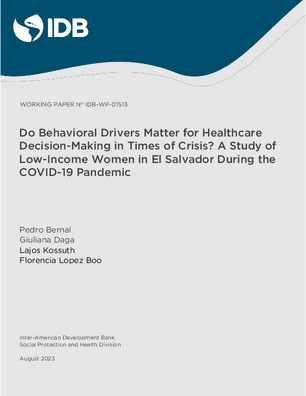Do Behavioral Drivers Matter for Healthcare Decision-making in Times of Crisis?: A study of Low-Income Women in El Salvador During the COVID-19 Pandemic
Date
Aug 2023
Understanding health-seeking behaviors and their drivers is key for governments to manage health policies. There is a growing literature on the role of cognitive biases and heuristics in health and care-seeking behaviors, but little is known of how they might be influenced during a context of heightened anxiety and uncertainty. This study analyzes the relationship between four behavioral predictors the internal locus of control, impatience, optimism bias, and aspirations and healthcare decisions among low-income women in El Salvador. We find positive associations between internal locus of control and preventive health behaviors during the COVID-19 pandemic (use of masks, distance, hand washing, and COVID-19 vaccination) and in general (prenatal checkups, iron-rich diets for children and hypertension tests). Measures of impatience negatively correlate with COVID-19 prevention behaviors and mothers micronutrient treatment adherence for children, and optimism bias and educational aspirations with healthcare-seeking behaviors during the COVID-19 pandemic. Some associations were more robust during the pandemic, suggesting that feelings of uncertainty and stress could enhance behavioral drivers influence on health-related behaviors, a novel and relevant finding in the literature relevant for the design of policy responses for future shocks.




